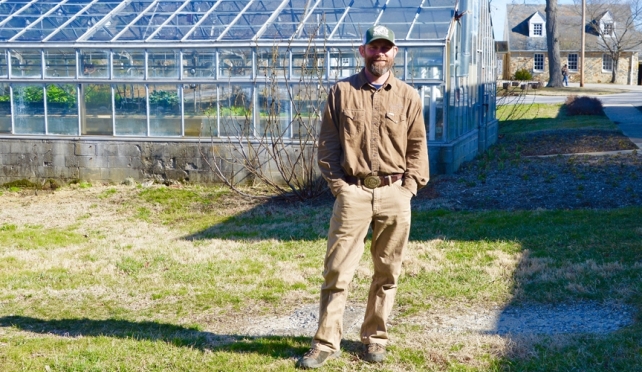Great Kids Farm (GKF) recently welcomed Matthew (Matt) Dobson as its new Farm Manager. Matt brings to the role extensive experience in management and farming, and a passion for educating children about sustainable agriculture and food systems. Below, he reflects on the road that brought him to Great Kids Farm and his plans looking ahead.
What inspired you to apply to be GKF’s Farm Manager?
After hiking the full Appalachian Trail last year, I decided I wanted to work in farm education or farmland conservation. I applied to positions in Maryland, Pennsylvania, Maine, and DC. This turned out to be the best combination of everything I was looking for in terms of actual farming and education. My sense is this program isn’t that well known, and everyone in the country needs to know about this place.
You spent the first part of your career in golf course management. What was that like?
After graduating from the University of Tennessee with a plant and soil science degree, I spent 17 years building a successful career in the golf industry. I was involved in all aspects of course management, construction, and consulting all over the world. After a while, I decided that spending the rest of my life in the golf business just wasn’t going to be fulfilling for me. I needed to do something more helpful to communities than grow grass.
You’ve also had experience running your own farm. How did that influence your decision to join Great Kids Farm?
For three years starting in 2013, I ran my own small farm operation—Preservation Farms—in Tennessee. It was a CSA that served 25-35 customers over a 21-week season. I grew a variety of fruits, vegetables, and mushrooms. I had goats, turkeys and chicken for meat, chickens for eggs, and bees for honey. Everything was done chemical, antibiotic, and hormone-free. Whatever excess I had, I’d sell at the local farmer’s market in Jonesborough, where in 2014 I started managing the Boone Street Market, a farm store that sold consumable products grown within a 100 miles. I’d visit local farms and food producers, learn about the practices, and help with ideas for sales in the store. Having those discussions is what convinced me I wanted to do more in the area of building awareness of farming and food systems. There’s a huge disconnect when it comes to the general public and our food system. By starting with inner city kids at a young age, hopefully we can make a big impact.
What are your plans for the Farm looking ahead?
We’ve started planning this season’s crops. For the Farm-to-Cafeteria program this spring, we’ll be growing spinach, kale, and arugula micro-greens. Over the summer, we’re looking at cucumbers, sweet peppers, cherry tomatoes, and melon. Part our decision-making has to do with the ease of cleaning, processing, and packaging produce for use in schools. I’d also like to start a mushroom cultivation area at the pond near the creek and add another undetermined livestock to the farm. We’ve just begun the process of recruiting young people to help out through the YouthWorks Baltimore summer job program. It’s a great way for students to gain experience and exposure to opportunities in food and agriculture.
What do you anticipate will be the biggest challenge?
There’s no shortage of great ideas for what can be done with the land here. The potential is endless. The challenge is figuring out what a relatively small team can accomplish given our educational focus. Labor is a finite resource. We need to find the best ways to use our labor efficiently.
What’s your favorite vegetable, and do you like to cook?
I like cherry tomatoes. They’re easy to grow, prolific, and you can pick and eat them in the field. I’m not exactly what you would call a cook. More and more, I tend to look at food as a source of nutrition and energy—and definitely something not to be wasted.


